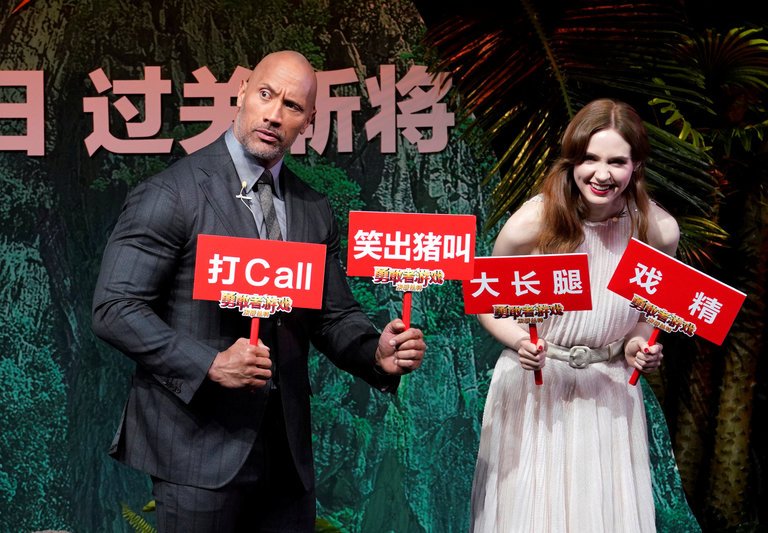Mixed script photo in the New York Times
« previous post | next post »
From Elijah Granet:
I am writing because of this picture I recently saw on the New York Times website:
The picture comes from this article (dated 7th January) on the success of the film “Jumanji: Welcome to the Jungle” in China. I was immediately struck by the odd mixed script on the leftmost sign. I don’t speak or read any language that uses Chinese characters, but I used Google Translate’s handwriting feature to identify the character as “打”. This left me quite confused, because Google Translate translates “打 Call” as “Call Call”. I know how unreliable GT can be, so I went to Wiktionary, which lists 22 different definitions for “打”. None of those, however, seemed to make any syntactic sense when combined with “Call”, so I have to assume that I'm missing some significant cultural or grammatical context here. (I suppose that is to be expected, since I don't know anything about the language I am amateurly trying to translate.)
Knowing your interest in mixed scripts (and growing frustrated with my inability to understand this), I thought I would send on the picture. Given that every other word in the picture is written solely in Chinese, I am very curious to know why “Call” was needed for the marketers of the film.
I can sympathize with Elijah's frustration, and I admire his tenacity and ingenuity in trying to solve the mystery of “打 Call” with the resources at his disposal. Consequently, I have reproduced the main part of his inquiry, even though I had not too long ago thoroughly explained “dǎ Call 打 Call” ("give a shout-out") in this post:
"East Asian multilingual pop culture" (10/31/17)
So that would have left me with nothing to do this time, were it not for the fact that I took it as a challenge to figure out all the other writing in the picture. Here's what we have:
The reverse writing behind behind Dwayne Johnson's head:
guòguān-zhǎnjiàng 过关斩将 ("overcome all the difficulties on the way"}, meaning to win in a competition by overcoming difficulties and defeating other contestants; a longer version of this chéngyǔ 成语 ("set phrase") is "guò wǔ guān zhǎn liù jiàng 过五关斩六将" ("passing through five checkpoints / passes and cutting down / killing six generals [in order to accomplish something]")
On the three other hand-held signs, from left to right:
xiào chū zhū jiào 笑出猪叫 ("laugh like a pig") — that is to say, something is so funny that, even if you try not to laugh, you can't help yourself and you burst out guffawing and snorting like a pig
dà cháng tuǐ 大长腿 ("big long legs") — signifying women with long legs, usually referring to pretty, tall, slim young women
xì jīng 戏精 (lit., "drama sprite / spirit") — this one has the most diverse implications, so I'll spend a bit more time on it; superficially it refers to an amazingly skilled actor, but it may also have a negative meaning because it often indicates that the person who is called by this term is a skillful cheater; the nuances of jīng 精 ("essence; daemon", and about two dozen other definitions) are difficult to explain, but it may help to understand its meanings in this sort of construction by comparing it to other similar terms: húlí jīng 狐狸精 ("fox spirit; vixen"), zhīzhū jīng 蜘蛛精 ("spider spirit"), yāojing 妖精 ("fairy; goblin; wraith"); generally, xì jīng 戏精 refers to someone who is exceptionally, almost preternaturally, talented in certain respects, to the point that he / she (usually she) becomes a spirit at doing that sort of thing; some creative translations of the term are "drama queen" and "attention whore" — either way it refers to someone who has lots of drama in her life and craves attention from others
So, thank you, Elijah! I had fun explaining all that!
[Thanks to Jinyi Cai and Jing Wen]

Victor Mair said,
January 11, 2018 @ 8:17 am
From Zeyao Wu:
"Xì jīng 戏精" (lit., "drama sprite / spirit") is a really popular internet phrase, and people may say "Nǐ de xì hěnduō 你的戏很多" ("You have a lot of plays / tricks / dramas") to describe people who do some unnecessary and weird things to attract others’ attention. One interesting thing is that, these days, there is a really popular tv show called "Yǎnyuán de dànshēng 演员的诞生" ("Birth of actors") and netizens call it "Xì jīng de dànshēng 戏精的诞生" ("Birth of drama spirits") because netizens think that these actors “show” too much.
VHM: Speaking of "show", this reminds me of the expression "zuòxiù 作秀" ("make a show") that was so popular in Taiwan about a decade ago (may still be popular now, and may also be [or have been] popular on the mainland). See the fifth paragraph here:
"Chinglish in English?" (5/8/14)
http://languagelog.ldc.upenn.edu/nll/?p=12245